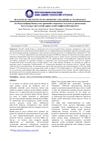 56 citations,
January 2013 in “International journal of trichology”
56 citations,
January 2013 in “International journal of trichology” Zinc supplements may be needed to treat hair loss in hypothyroidism.
 9 citations,
April 2023 in “Journal for Research in Applied Sciences and Biotechnology”
9 citations,
April 2023 in “Journal for Research in Applied Sciences and Biotechnology” Zinc is important for growth and health in animals, plants, and humans, and not having enough can cause various problems.
[object Object]  5 citations,
July 2017 in “Women & Health”
5 citations,
July 2017 in “Women & Health” Nursing women in the West Bank with higher income and non-smoking habits have higher blood zinc levels.
 5 citations,
December 2014 in “Polish Journal of Public Health”
5 citations,
December 2014 in “Polish Journal of Public Health” Zinc is essential for many body functions and imbalances can lead to health problems.
 2 citations,
July 2019 in “Journal of psychology & clinical psychiatry”
2 citations,
July 2019 in “Journal of psychology & clinical psychiatry” Zinc helps reduce the severity of depression.
 June 2024 in “Research Square (Research Square)”
June 2024 in “Research Square (Research Square)” Copper deficiency is linked to post-COVID-19 hair loss in women.
 December 2022 in “Himi, himijn tehnologijn hùrèèlèngijn èrdèm šinžilgèènij bùtèèl”
December 2022 in “Himi, himijn tehnologijn hùrèèlèngijn èrdèm šinžilgèènij bùtèèl” Hair products with copper and zinc enriched yeast made hair thicker and denser.
 January 2021 in “Middle East journal of applied sciences”
January 2021 in “Middle East journal of applied sciences” Zinc is essential for plant growth and human health, but many soils lack enough zinc, affecting crops and potentially leading to health problems.
 January 2012 in “Vitamins & trace elements”
January 2012 in “Vitamins & trace elements” Smoking and drinking can lower vitamin levels and potentially trigger early hair loss, but overall vitamin levels don't seem to affect hair loss duration.
 63 citations,
May 2017 in “American Journal of Clinical Dermatology”
63 citations,
May 2017 in “American Journal of Clinical Dermatology” People with alopecia areata often have lower levels of vitamin D, zinc, and folate, but more research is needed to understand if supplements can help treat it.
 January 2024 in “Biochemical and Biophysical Research Communications”
January 2024 in “Biochemical and Biophysical Research Communications” Lack of zinc can cause hearing loss by damaging important parts of inner ear cells in mice.
 September 2022 in “International Journal of Health Sciences (IJHS)”
September 2022 in “International Journal of Health Sciences (IJHS)” Low zinc levels may contribute to hair loss due to increased oxidative DNA damage.
20 citations,
June 2020 in “Journal of Advanced Research” High-dose vitamin A and E with zinc improved blood sugar control and insulin function in diabetics, but may cause hair loss.
1 citations,
August 2012 in “Journal of Emerging Trends in Engineering and Applied Sciences” 
The new gel with Zinc Oxide nanoparticles and finasteride shows promise for treating hair loss when applied to the skin.
 August 2022 in “International Journal of Health Sciences (IJHS)”
August 2022 in “International Journal of Health Sciences (IJHS)” Low levels of zinc, ferritin, and vitamin B12 are linked to severe hair loss in pregnant women during their last two trimesters.

Iron and zinc deficiencies may be treated to help female hair loss.
 30 citations,
January 2013 in “International Journal of Trichology”
30 citations,
January 2013 in “International Journal of Trichology” The most common causes of hair loss in Jordanian children are fungal infections, autoimmune hair loss, and hair shedding after fever, with zinc deficiency also being a notable cause.
16 citations,
May 2009 in “Journal of child neurology” Valproic acid does not change biotinidase enzyme activity in children's blood.
14 citations,
September 2021 in “International journal of molecular sciences” Zinc pyrithione needs targeted delivery to the scalp for effective dandruff treatment.
13 citations,
April 2019 in “International journal of molecular sciences” Acyzol could help treat conditions caused by zinc deficiency.
 13 citations,
January 2015 in “International Journal of Trichology”
13 citations,
January 2015 in “International Journal of Trichology” Higher lead and cadmium, and lower zinc and iron levels in the blood might be linked to chronic hair loss in women.
 4 citations,
December 2022 in “International Journal of Molecular Sciences”
4 citations,
December 2022 in “International Journal of Molecular Sciences” Zinc is crucial for skin health and treating various skin disorders.
[object Object]  3 citations,
November 2020 in “Biological Trace Element Research”
3 citations,
November 2020 in “Biological Trace Element Research” Men with hair loss may lack zinc, copper, and vitamin D; supplements could help.
 2 citations,
May 2021 in “Case reports in dermatological medicine”
2 citations,
May 2021 in “Case reports in dermatological medicine” A 28-year-old man with type 1 diabetes had skin and hair issues due to zinc deficiency.

Zinc levels and lymphocyte counts might be important in heart disease development.
 November 2023 in “Biology”
November 2023 in “Biology” Lower hair copper and copper-to-zinc ratio are linked to more severe coronary artery disease.
 February 2023 in “Journal of clinical medicine research”
February 2023 in “Journal of clinical medicine research” Zinc acetate hydrate may help reduce fatigue and hair loss in post-COVID-19 patients.
 January 2023 in “Theranostics”
January 2023 in “Theranostics” A patch with curcumin-zinc can improve hair growth and health by delivering beneficial particles to the skin, increasing hair follicles, and reversing effects of a hair loss hormone.

An infant with a zinc deficiency skin disorder improved with zinc treatment.

























